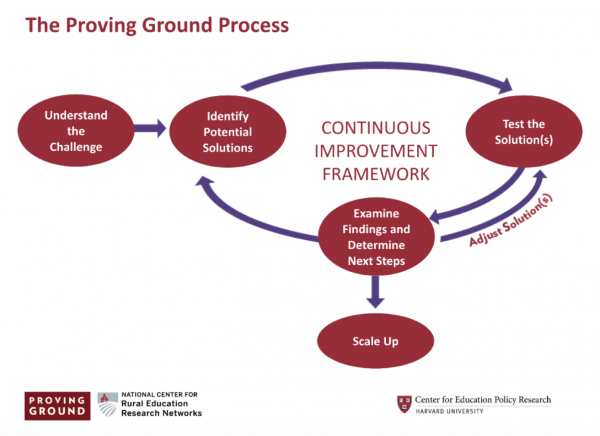IMPROVING IMPROVEMENT: INTRODUCTION
David Hersh | Proving Ground and Jennifer Ash | National Center for Rural Education Research Networks (NCRERN)
Volume 2 Issue 1 (2020), pp. 21-22

“Improving Improvement” is a new series in NNERPP Extra focused on leveraging the power of research-practice partnerships (RPPs) to build schools’, districts’, and states’ capacity to improve. As the leaders of Proving Ground, we are excited for the opportunity to share lessons about bridging the research-practice divide drawn from our experience supporting two continuous improvement networks in the never-ending quest to find better ways to serve students and families. These lessons range from insights about how to support education agencies in tackling fundamental challenges like chronic absenteeism to lessons our partners have learned as they work with us. We’ll also share our “Proving Ground How-to Guides,” short briefs to help practitioners select and implement the interventions partners in our networks have found effective. Finally, we hope that “Improving Improvement” will be a two-way conversation, and you will reach out to us with any questions, comments, or insights of your own along the way.
Who We Are
We are Proving Ground, an initiative of the Center for Education Policy Research at Harvard University, that works with local and state education agencies around the country to build their capacity to select, pilot, test, and scale solutions to problems they identify. To support education agencies, Proving Ground operates two networks: a network of larger, mostly urban, school districts (the Proving Ground Network) and a network of smaller, rural school districts (the National Center for Rural Education Research Networks or NCRERN). The Proving Ground Network currently includes 9 districts serving nearly 360,000 students. NCRERN includes 49 districts serving nearly 60,000 students across Ohio and New York. In both cases, we work with states to help even more of their districts by sharing our networks’ lessons learned.
What We Do
Proving Ground guides partners through a continuous improvement process anchored by randomized controlled trials. First, we help partners use their data to diagnose problems, identify root causes, brainstorm potential solutions, and design and pilot the most promising ideas in their schools. Then, we conduct rapid cycle evaluations of their progress so we can tell them how well their customized solution worked, often in less than a semester. Finally, we help them use the evaluation results to decide whether to scale up, modify, or drop their piloted solution. Throughout the process, we help our partners engage stakeholders – especially students, families, and staff – to improve design and implementation, increasing the chance that their solutions will work.

Results So Far
We are just getting started with our rural partners in NCRERN – they will select and design their first interventions in April. Our Proving Ground Network partners, however, have completed two improvement cycles with us. In those cycles, they’ve collectively executed over 20 pilots covering 9 interventions. Six interventions, ranging from messaging to mentorships, cost-effectively improved attendance. Three interventions did not have enough impact to justify their cost. Our partners have scaled the cost-effective interventions and discontinued the rest. Along the way, they’ve become better consumers of their own data and engaged hundreds of students, families, and staff in constructive conversations. We’re looking forward to tackling new issues with new partners in the months and years to come.
>> RESOURCE: One of the effective interventions, postcards to parents of early-grade students, is the subject of the first Proving Ground How-to Guide, hyperlinked here. We hope you’ll read it and suggest it to the agencies you work in and with.
Looking Ahead
In future installments of “Improving Improvement”, we’ll share our experience working with both large, urban districts and small, rural ones and dive deeper into our continuous improvement approach. Also look for case studies co-authored by our partners, and lessons learned for practitioners hoping to bridge the research-practitioner divide.
We are also always open to additional suggestions for topics for future editions of “Improving Improvement”. Reach out to us with any questions you have about our networks, continuous improvement process, or ideas you’d like to see us tackle.
David Hersh (david_hersh@gse.harvard.edu) is Director of Proving Ground and Jennifer Ash (jennifer_ash@gse.harvard.edu) is Director of the National Center for Rural Education Research Networks (NCRERN).
Suggested citation: Hersh, D., & Ash, J. (2020). Improving Improvement: Introduction. NNERPP Extra, 2(1), 21-22.
NNERPP | EXTRA is a quarterly magazine produced by the National Network of Education Research-Practice Partnerships | nnerpp.rice.edu